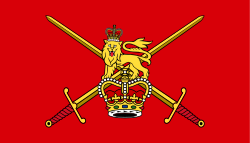 |
| British Army lists |
|---|
| French Revolutionary and Napoleonic Wars |
| Victorian era |
| First World War |
| Second World War |
| Regiments |
| Officers |
| Other |
This is a list of numbered Regiments of Cavalry of the British Army from the mid-18th century until 1922 when various amalgamations were implemented. The Life Guards were formed following the end of the English Civil War as troops of Life Guards between 1658 and 1659. [1] Regiments were subsequently raised as part of the response to (i) the Monmouth Rebellion in 1685 (ii) the Jacobite rising in 1715 (iii) the Seven Years' War in 1759 and (iv) the Indian Rebellion in 1858. [2]
The designation "dragoon guards" was introduced in 1746 to recognise the importance of some of the most senior regiments, who rode large strong horses, without actually increasing their pay. [3] The more junior regiments, who rode lighter horses, were designated "dragoons" at that time, although some of them were subsequently re-designated "lancers" or "hussars". [3]
The full list is as follows: [4]
Household cavalry:
| Number | Title | Formed | Fate | Successor 2018 |
|---|---|---|---|---|
| 1 | 1st Regiment of Life Guards | 1658 (as troops of life guards) [5] | 1922: Life Guards | Life Guards |
| 2 | 2nd Regiment of Life Guards | 1659 (as troops of life guards) [6] | 1922: Life Guards | Life Guards |
| 3 | Royal Horse Guards | 1661 (reformed on the Royal establishment) [7] | 1969: Blues and Royals | Blues and Royals |
Heavy cavalry
| Number | Title | Formed | Fate | Successor 2018 |
|---|---|---|---|---|
| 1 | 1st King's Dragoon Guards | 1685 [8] | 1959: 1st The Queen's Dragoon Guards | 1st The Queen's Dragoon Guards |
| 2 | 2nd Dragoon Guards (Queen's Bays) | 1685 [9] | 1959: 1st The Queen's Dragoon Guards | 1st The Queen's Dragoon Guards |
| 3 | 3rd (Prince Of Wales's) Dragoon Guards | 1685 [10] | 1922: 3rd/6th Dragoon Guards | Royal Scots Dragoon Guards |
| 4 | 4th (Royal Irish) Dragoon Guards | 1685 [11] | 1922: 4th/7th Dragoon Guards | Royal Dragoon Guards |
| 5 | 5th (Princess Charlotte of Wales's) Dragoon Guards | 1685 [12] | 1922: 5th/6th Dragoons | Royal Dragoon Guards |
| 6 | 6th Dragoon Guards (Carabiniers) | 1685 [13] | 1922: 3rd/6th Dragoon Guards | Royal Scots Dragoon Guards |
| 7 | 7th (Princess Royal's) Dragoon Guards | 1688 [14] | 1922: 4th/7th Dragoon Guards | Royal Dragoon Guards |
Light cavalry: